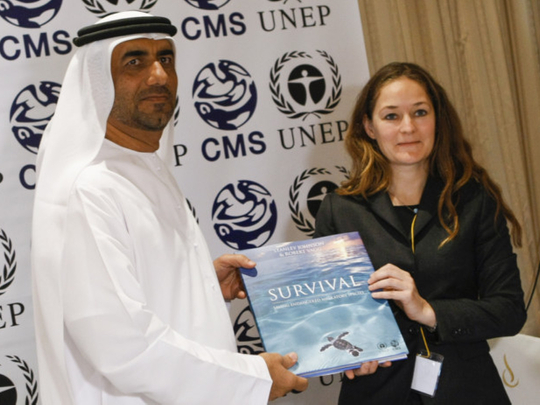
Dubai: The UAE has signed a new agreement to protect migrating sharks as efforts continue against shark fin traffickers.
Eight other Arab countries signed the agreement in Dubai at the City Seasons Suites hotel on Monday.
A UAE official told Gulf News the agreement forms part of wider local measures to protect all sharks against over-exploitation.
Monday’s commitment is known as the Memorandum of Understanding on the Conservation of Migratory Sharks.
It has been introduced by the UN-linked Convention on the Conservation of Migratory Species of Wild Animals (CMS).
Some shark species are under threat from unsustainable fishing practices that include shark fining, which is illegal in the UAE.
The UN says some 70 million sharks are killed every year to feed the global appetite for shark fin.
Shark fins are hugely popular in China and the Far East for use in soups and traditional medicine.
A bowl of shark fin soup can cost up to $100 (Dh370).
Some traffickers slice off the fins and dump the body back into the sea, causing the shark to die a slow, agonising death.
UAE regulations say sharks must be landed whole at the fish market.
Authorities are also creating a federal framework for greater protection of sharks, said Ahmad Al Hashemi, director of the Ministry of Environment and Water’s biodiversity department.
“We are working now in process to develop a national plan to conserve sharks species that are under pressure,” Al Hashemi said.
Some of the species covered under the MoU, such as the whale shark, are already protected by UAE law, he added.
Local regulations also protect other marine animals such as the dugong.
Al Hashemi said UAE fishermen will receive training in identifying the migratory sharks.
“We try to protect all shark species, but with this MoU the focus in on the migratory species… We don’t have clear numbers on the species passing through UAE waters.”
Some sharks are “non-target” or “by-catch”, meaning they are caught up in the hunt for other marine animals.
Others are hit by boats or face problems migrating because of climate change altering temperatures.
The agreement was signed on the sidelines of workshop sessions for government and conservation officials organised by the International Fund for Animal Welfare (IFAW) in association with the MoEW.
Peter Pueschel, IFAW’s Director of International Environmental Agreements, said the MoU was “the first step in a clear commitment to look at conservation needs. It can be taken seriously.”
He added countries in the future may want to require shark traders to obtain special export permits to ensure the shark parts are not from endangered species.
“That could help fight smuggling and illicit trade,” Pueschel said.
Andrea Pauly, CMS’s Associate Programme Officer, described the agreement as a “political commitment to make conservation of migratory sharks a main objective.”












